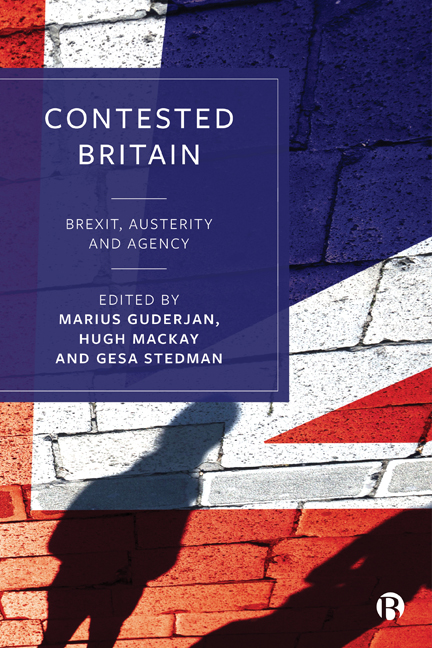Introduction
Published online by Cambridge University Press: 10 March 2021
Summary
Governing the UK has always been complex and fluid, but recent years have been particularly turbulent. Political parties were forced into coalition at Westminster in 2010, Scotland came close to leaving the union in 2014, the UK voted to leave the EU in 2016 and the Conservatives were forced into a minority government in 2017 under the leadership of Theresa May, who was forced to resign by her own party and was replaced as Prime Minister by Boris Johnson in July 2019. While by the time this book is published a new Prime Minister or a new party may be in power, this book offers a powerful and distinctive analysis of how the politics of the UK and the lived experience of its citizens have been contested in the first decades of the 21st century. It sets out to explore and understand the Brexit vote, not only in its own right but also as an expression of wider shifts in the UK's social and political structures and discourses, in particular regarding the experience of and responses to austerity. In order to comprehend the complexity of what Britain is or will be, the book links Brexit and austerity to a crisis of agency and who is or is not able to exercise agency in the UK, and to what degree. Notions of agency are mobilized because they help to understand the role of austerity (as politics and lived experience) as a fundamental cause of Brexit.
The book brings together authors from the constituent parts of the UK with others from Germany. It is the product of an ongoing set of debates fostered by an interdisciplinary research network. Incorporating sensibility and thinking from beyond the UK, the voices from the outside add a mainland European perspective on what is developing in the UK. In doing so, it goes beyond traditional disciplinary approaches by drawing on insights from cultural studies, political science, sociology, geography and law. It uses comparative material from the regions of England and from the other nations of the UK, and explores the profound differences – of geography (the social zoning of cities and the disparities between regions), generation, gender, ‘race’ and class – in how austerity is experienced.
- Type
- Chapter
- Information
- Contested BritainBrexit, Austerity and Agency, pp. 1 - 16Publisher: Bristol University PressPrint publication year: 2020

